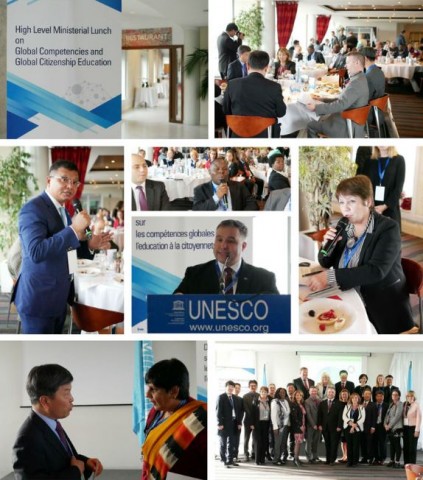
GCED Basic Search Form
Quick Search
You are here
News

On the occasion of the 39th Session of the UNESCO General Conference, a High-Level Ministerial Side Event took place with the title of ‘Dialogue on Global Competencies and Global Citizenship Education’ on 2 November at the UNESCO Headquarters. This side event was hosted by the Ministry of Education of the Republic of Korea and the Council of Ministers of Education of Canada, with the partenership of APCEIU and Global Affairs Canada. The dialogue attracted about 110 high-level participants, including 36 education ministers of Member States, as well as ambassadors from permanent delegations and senior officials from around the world. They gathered to discuss transformative and innovative education strategies to promote global competencies and global citizenship education.
Ambassador Elaine Ayotte, Permanent Delegate of Canada to UNESCO welcomed the ministers and high-level officials to the dialogue by emphasizing the commitment of Canada and Korea to education and the realization of Education 2030 by saying “Canada and Korea, although different, have many common positions in the field of education. I believe that the reason why our two countries are here today is because Education 2030 agenda is a cornerstone for both our countries, which reaffirms the importance of providing opportunities to achieve education for the better.” Also, Ambassador Lee Byeong Hyun, Permanent Delegate of the Republic of Korea to UNESCO highlighted the role and need of GCED in a rapidly changing world and urged the efforts of stakeholders by saying “We need to mobilize resources and make the best use of those resources to transform learning environments. This requires collective endeavors of all stakeholders involved in the process, including teachers, communities and policy makers to promote global citizenship education beyond classrooms.” Followed by opening remarks, Mr Qian Tang, Assistant Director-General for Education of UNESCO highlighted the important role of the Republic of Korea and Canada in promoting GCED and contributing to the realization of SDG 4.7. As well, he thanked APCEIU for its invaluable contribution to GCED.
Showcasing the two countries’ work on global competencies and global citizenship education, education ministers from Canada opened the floor to share best practices. Honorable Dale Kirby, Minister of Education and Early Childhood Development of Newfoundland and Labrador, and the Honorable Sebastien Proulx, Minister of Education, Recreation, and Sports of Quebec introduced 6 components of Canada’s Global Competencies (►Critical thinking and problem solving, ►Innovation, creativity and entrepreneurship ►Learning to learn/self-awareness and self-direction ►Collaboration ►Communication ►Global citizenship and sustainability) and shared education reforms in Canada that aim to put global competencies and foster global citizenship at the forefront of education.
On behalf of the Honorable Deputy Prime Minister and Minister of Education of the Republic of Korea, Kim Sang-Kon, Mr Yeonghan Choi, Director General of International Cooperation Bureau of the Ministry of Education of the Republic of Korea, talked about lessons learned and challenges in implementing Sustainable Development Goal 4 and Global Citizenship Education. He shared that despite rapid economic development of the country, there are still limitations in the implementation of GCED in the Republic of Korea, but strongly pointed out that this is the future of education for the country. “At this point where the country has flourished, the only way towards further development is to enhance the capacities of the future generations to be sensitive with global challenges and to creatively find solutions.”, mentioned Mr Choi. He also shared the partnership effort with APCEIU in promoting GCED in transforming education in the Republic of Korea towards fostering global citizenship. He introduced initiatives such as the GCED Lead Teachers and International Teacher Exchange Programme, and other programmes that promote international cooperation for education in the Asia-Pacific and beyond.
After the presentations from Canada and Korea, the participants were invited to a dialogue moderated by John McLaughlin, Deputy Minister, Department of Education and Early Childhood Development of New Brunswick. The discussion questions focused on challenges and successful initiatives or strategies in developing GCED in schools. Honorable Joof Batlara, Minister of Higher Education of Gambia asserted the political and religious challenges Gambia faces should be tackled with education, especially through GCED to sustain peace. Honorable Benghabrit Remaoun Nouria, Minister of National Education of Algeria shared the serious social issues in Algeria such as social and political turmoil and extreme violence, and highlighted that GCED represents the need to transform education in Algeria. Also, she applauded the work of UNESCO to provide tools and materials on GCED, such as the 『GCED Topics and Learning Objectives』, supported by APCEIU in 2014.
The high-level participants had an opportunity to share their experiences and expertise on policy frameworks and implementation of GCED through this dialogue. Honorable Mr Hang Chuon Naron, Minister of Education, Youth and Sport of Cambodia shared a current initiative in Cambodia, called “New Generation Schools” which provided resources, equipped teachers and updated methodology that allow students to work in a team and promote collaborative learning. He further mentioned that Cambodia is cooperating with APCEIU to integrate GCED in their national curriculum, which will help students to face and tackle global challenges. Also, Honorable Mr John Chrysestom Muyingo, Minister of State for Higher Education of Uganda mentioned Uganda took the initiative of integrating GCED in the national curriculum in Uganda, a collaborative initiative with APCEIU. Even though the curriculum was not yet wholly changed, it gave an opportunity for schools to complement with new materials for learners and teachers, and to educate trainers.
The High-Level Ministerial Side Event contributed to the continued discussion on global competencies and global citizenship education, an integral part of the discussions and debate during the 39th Session of the UNESCO General Conference. Being part of the strategic objectives of UNESCO in the next biennium (2018-2019), the high-level side event was an important opportunity to enhance partnership amongst different stakeholders, particularly with ministries of education, towards realizing SDG 4.7.
URL:
